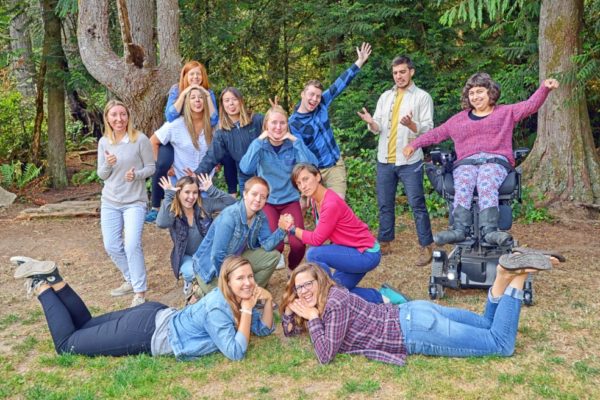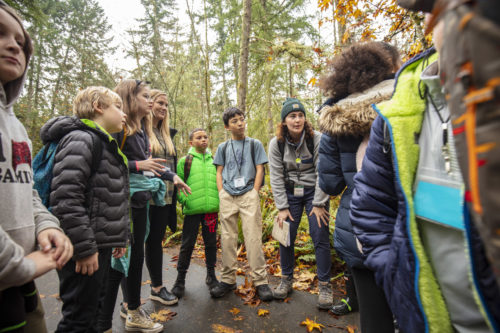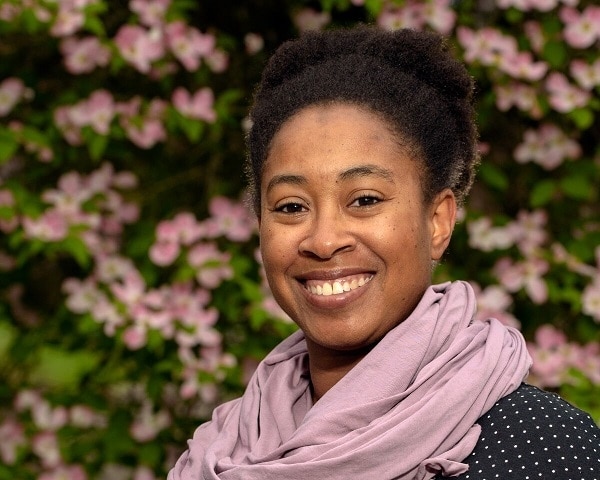On the South end of Bainbridge Island, just northeast of Blakely Harbor is a “School…
School groups typically come to programs on IslandWood’s Bainbridge Island campus hoping for a few things: that students will get the opportunity to learn in nature, that their curiosity and care for the world will deepen, and maybe that they’ll get to eat one or two of our well-loved birdseed cookies.
But this past spring, we heard from teachers about two of the most important things their students gain from their experience at IslandWood: team-building and socio-emotional growth.
We recently sat down with Campus Programs Manager Breanna Caruso to learn more about the feedback we’ve been hearing from teachers, and how we’re evolving our Bainbridge-based School Day Programs and School Overnight Program (SOP) to provide trauma-informed support and community connection for students this school year.
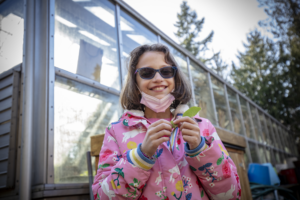
A day programs participant on IslandWood’s Bainbridge Island campus.
What themes have you seen emerge from school groups this past spring? What are teachers hoping their students will get out of their time at IslandWood?
When we talk with schools as they’re preparing for their visit, we always ask “What do you want to get out of your experience?” And in the beginning of the year we always hear “team-building.” Then, over the course of the year, that usually fades into the background a little bit.
But this past spring, five out of nine school groups specifically chose to focus on community connection and team-building, out of multiple day program options. A lot of folks were looking for opportunities to support that social-emotional element for their students, especially because building connection was challenging this past year. In some ways, what we saw was that students who would typically seem like end of the year fifth graders seemed more like beginning of the year fifth graders. In a typical year during SOP, the feeling from students tends to be, “Oh yeah, I can talk about my feelings here, because I’ve been in this class and in the same space with these people for four or five months, or for almost a whole school year.” And this spring it felt more like, “I’ve only seen your face in a box, and now you want me to tell you about my feelings in front of all these people?”
Working out how we can help develop classroom trust and connection has been a big part of our conversations in the Education Team recently.
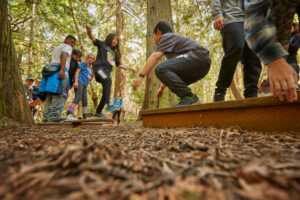
A School Overnight Group on the team’s course working together to solve a challenge on IslandWood’s Bainbridge Island Campus.
What makes SOP – and outdoor education as a whole – so conducive to community-building?
For me, a big reason is the shared experience. Students are coming from so many different backgrounds and bring so many different experiences with them to the classroom. Having shared experiences allows all students to gain the same knowledge and participate in the same activities, which is huge in terms of forming a communal bond.
When students are outside, they can also use nature as a “third point.” [Note: this refers to a communication technique typically used to reduce awkwardness or discomfort during conversations, in which two people talk while sitting side-by-side and looking at a shared focal point in front of them.] Reducing eye contact and using elements of nature that are right in front of us can help students form connections and make conversations feel less risky. For some students, it’s really hard to sit and talk about emotional things like, “I should be kind to you.” But if we’re talking about things like, “Why should we be kind to slugs? How does being kind to slugs apply to our everyday lives?” those conversations become easier.
Another huge element of outdoor learning is that it can help students develop greater empathy, kindness, and consideration for things beyond themselves. By holding our programs in nature, we’re reducing some of the boundaries that can exist in other contexts. When they come to IslandWood, students all have access to the same opportunities and they’re all involved in similar conversations.
Nature is also a setting where students who don’t typically thrive in the context of four walls and a desk can sometimes feel more comfortable. At the same time, it’s important to acknowledge that not everyone feels comfortable outside. But it’s an opportunity for a different kind of experience.
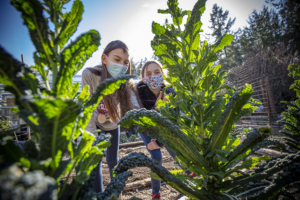
Two students working together in the Garden Classroom on IslandWood’s Bainbridge Island Campus.
What changes to the SOP experience will we be making to further support community-building and socio-emotional development?
One of the things that we’re planning to do this year – and something that we typically do with graduate student instructors – is to provide trauma-informed training for our educators around ACEs (Adverse Childhood Experiences). I think a lot of people don’t associate ACEs with what children have experienced this past year, but the pandemic can be seen as an Adverse Childhood Experience. So we’re thinking deeply about how we teach with that lens.
We’re also paying attention to assumptions we typically make about school groups that may need to be challenged. Going forward, we’re more aware than ever that we need to challenge some of the assumptions that we typically walk into teaching experiences with. For example, this past spring, each school we worked with had a different experience in terms of whether they had spent time together in person or not, and a variety of other factors. That’s been a big learning for us in general. COVID-19 has helped us look at so many things again and think, “What works? What doesn’t work?”
Another example is that, before school groups arrive for SOP, we ask teachers to rate their students’ comfort and familiarity with a variety of different content areas. Going forward, I think it will be helpful to also ask them how the pandemic has impacted these areas. The more information we can have up front, the better prepared our instructors will be. We want teachers to know that we’re always asking, “How can we best support you? We’re going to be as prepared as we can be before you get here.”
We’re thinking a lot about how we can support socio-emotional learning in other ways as well. For instance, after the past year and a half, I feel we might see more homesickness than usual this school year. We noticed more homesickness this past summer during summer camps, especially since, for many kids, these are their first experiences away from home all year. For some kids, that’ll be hard and for some it’ll be great. I’m expecting students’ reactions to be a mix of “What do I do around all of these people?” and “I get to be with all these people!”
If you haven’t already, subscribe to our newsletter to stay tuned for more updates as we continue to evolve our programs on Bainbridge Island, and learn more about all of our education programs here.

